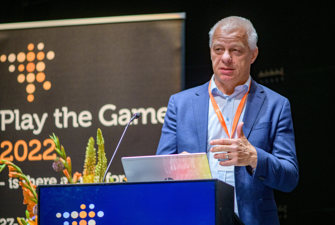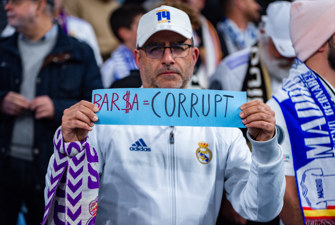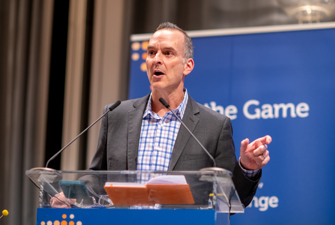ClearingSport advisors call on sports to engage in debate on worldwide integrity body
A new international entity against breaches of sports integrity must be more independent than WADA and build on more stakeholders than states and Olympic organisations. But there are lessons to learn from WADA and good reasons sports should change its attitude to oversight, say three advisors to the ClearingSport project.
Although the ClearingSport proposal for an entity against crime, corruption and other integrity breaches in sport is not aimed at creating a copy of a World Anti-Doping Agency, a lot can be learned from more than 25 years of international anti-doping cooperation.
One of the key conclusions of the project is that an entity must be fully independent from the sports organisations it is set to monitor, but three members of ClearingSport’s advisory group hope that the International Olympic Committee (IOC) and international sports federations will nevertheless engage and overcome their resistance to external oversight. Otherwise, they are at risk of falling victim to international criminal forces much stronger than sport can tackle.
One who knows WADA from the inside as a member of WADA’s athlete committee from 2017-2020, is Chiel Warners, a legal and financial consultant who has chaired ClearingSport’s advisory group.
He observes that the progress in anti-doping is due to worldwide regulation mechanisms:
“Something crucial is the World Anti-Doping Code that harmonises anti-doping policies, rules, and regulations with sports organisations and among public authorities,” says the former Olympic athlete and member of WADA’s Athlete Commission.
“Together with two conventions from the Council of Europe and UNESCO, the code creates a strong and consistent framework supporting the fight against doping. Compared to, for instance, match-fixing and safeguarding in sport, the fight against doping is further advanced because of this.”
Nevertheless, Warners does recommend copying the decision-making model in WADA, which is based on a model of 50 per cent stakeholders from public authorities and 50 per cent stakeholders from sports to a new entity to fight corruption and crime.
“The WADA model is not as inclusive as it should be towards other crucial stakeholders, and it makes for some problems in decision-making as we have seen over the last decade in particular,” he argues.
Chiel Warners. Photo: Thomas Søndergaard/Play the Game
Sport is under growing threat
The chair of the advisory group adds that the ClearingSport project is important to him because sport’s ability to do good is under growing threat.
“Sport is an industry that is worth between 500 billion and one trillion US dollars, and that is not even including the betting, both legal and illegal, that is made possible by sport. Those financial interests are huge and draw attention not only from those inside and outside sports who want to do good,” Warners says.
“Coming from a legal and financial environment that is far from perfect, I know what impact a strong regulator can have, both positive and negative. To make sure we don’t end up in a crisis like in 2008 in the financial industry that will shake sport to its core, we need to think and act now to find ways to keep sport clean, safe, and credible for all to enjoy.”
He adds that unlike any other sector in society, sport is structured and governed in essentially the same way as when most national and international organisations were born more than hundred years ago.
“The effect is that sport just isn’t set up to take care of issues like corruption, financial crime, money laundering, etc. Sports organisations don’t have the tools, the capacity, and frankly not the authority to do what law enforcement or a regulatory agency would do in the rest of society,” says Warners.
Resistance is expected
Chiel Warners notes that the structure and the governance of sport wouldn’t be an issue if the sports organisations would let law enforcement act in sport.
“However, as we have seen several times, as soon as there is a hint of outside scrutiny, sport flaunts its autonomy to quash that.”
Sport’s traditional reaction to external scrutiny is also the reason why Warners expects the ClearingSport project’s proposals to be met with some resistance.
“However, by making the proposal clear and concise, and not just an abstract idea of ‘something needs to be done’, we welcome discussions on the back of it. If you don’t agree with the solution or part of it, please explain why and help us figure out how it could be done,” he argues.
Another member of ClearingSport’s advisory group is Miguel Maduro, a professor and dean at Católica Global School of Law in Portugal. Photo: Thomas Søndergaard/Play the Game
Susceptible to criminal activities
Another member of ClearingSport’s advisory group, Miguel Maduro, a professor and dean at Católica Global School of Law in Portugal, hopes that sports governing bodies will now take part in the development of a new entity.
“In recent years it has been increasingly clear that the commercialisation of sports, coupled with the failures in its governance models and transnational nature, have made it particularly susceptible to criminal activities from corruption to money laundering and from psychological and sexual abuses and human rights violations,” says Maduro who was also advocate at the Court of Justice of the European Union from 2003 to 2009.
He adds that the prevention and combat of these illegal activities requires a regulatory and institutional framework that sports governing bodies do not want or haven’t been able to set up while state regulatory authorities also seem incapable to impose it on their own.
“All of this makes it fundamental to promote the development of an international or regional body or agency with the powers to promote such a regulatory and governance framework,” Maduro says.
“I hope this initiative will trigger a necessary debate and will lead to the creation of such an agency which will hopefully involve the sports governing bodies but needs to also be independent from them.”
David Howman, chair of the Athletics Integrity Unit of World Athletics, is another member of the ClearingSport project’s advisory group. Photo: Thomas Søndergaard/Play the Game
Cross fertilisation in sports crimes
David Howman, chair of the Athletics Integrity Unit of World Athletics, is another member of the ClearingSport project’s advisory group. As a former director general of WADA from 2003 to 2016, he has been advocating the idea of an entity to investigate all integrity breaches in sport since 2009 when WADA investigations found that cross fertilisation took place in sports crimes.
“The people who were breaking the rules or helping people cheat were not just doing it in doping but also in other areas of sport. It makes good common sense to broaden the investigations, so I am pleased to see that the task is taken up by the group and I am happy to be part of it and optimistic that it will go further,” Howman says.
To him, sport is basically run by the IOC, FIFA, and a few other strong international sports organisations, and he hopes that the newly elected IOC president Kirsty Coventry and some of the other top leaders of the international organisations might look at these issues and decide they are worth further examination.
“I think there have been significant advances made as a result of the bodies that have been already established to look at wider aspects of integrity in sport,” he argues with a reference to World Athletics’ integrity unit and similar initiatives.
Anti-doping may be disappearing
However, finding public funding for a new entity to fight crime and corruption in sport could be a political challenge, Howman says and warns that public funding of anti-doping is at risk too.
“When it comes to governments, I am concerned that anti-doping might be disappearing, and that, with the financial woes many countries now have, anti-doping goes to the bottom of the ladder and that might just be sufficient to tip it.”
He says the controversy relating to the US withdrawing its funds from WADA indicates that there is always a risk of anti-doping disappearing.
“It would be silly to say there wasn’t a risk. I think the risk can be overcome, but it takes strong people who have a bit of guts to do it,” he says and adds that it will take a good deal of persuasion to get more public money to fight integrity breaches in sport considering all the other societal problems and issues national governments must answer to.
Howman argues that these political and economic challenges also make it relevant to look at the possibility of having one entity countering all integrity breaches instead of having one entity for anti-doping and another one for anti-corruption and other crime.
He also argues that safeguarding is an area that requires different expertise and people than the other integrity issues and should be looked at separately.
“Safeguarding is a big issue that needs to be looked at in its own by the right people, and they are not necessarily the same people who might be investigating crimes in sport such as anti-doping, corruption, event manipulation, or betting payments.”
ClearingSport’s advisory group
Since the beginning of 2024, the ClearingSport project has benefited from advice from an advisory group including the following experts:
- Chiel Warners (chair), CW Consulting, the Netherlands
- Ana María Arias, lecturer, Universidad de Ciencias Aplicadas y Ambientales, Colombia
- Steven Berryman, principal at Berryman Prime LLC, USA
- Ingrid Beutler, senior partner, ThinkBeyond, Switzerland
- Teemu Japisson, secretary general, Finnish Center for Integrity in Sport (FINCIS), Finland
- Maximilian Klein, representative for international sport policy, Athleten Deutschland, Germany
- Drago Kos, anti-corruption expert, Slovenia
- Thomas Könecke, associate professor, KU Leuven, Belgium
- Miguel Maduro, dean at Católica Global School of Law, Portugal
- Tom Mangine, financial crimes compliance consultant, Ernst & Young, USA
- Alex Phillips, Secretary General, FIFPRO, Switzerland
- Brendan Schwab, director of Schwab Legal, Australia
- Ed Stier, former senior US and New Jersey state prosecutor, USA
- Allison Wagner, director of athlete & international relations, USADA, USA
- Brian Wesaala, founder, CEO, Football Foundation Africa, Kenya
The ClearingSport project’s proposal of an entity to fight integrity breaches in sport will be open for debate at a Play the Game webinar on Thursday 3 April from 15.30-18.30 CET. Register for the webinar here





